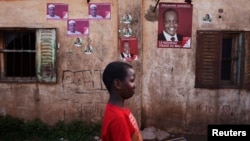BAMAKO —
Malians go to the polls Sunday for a presidential election that is seen as the first step toward getting the country to recover from a disastrous 18-month crisis that saw a military coup in the south and an Islamist takeover of the north.
There are high hopes for this election, but it is not without risk.
Mali had just a few short months to prepare for the vote and it was a race to get things done. People lined up outside voting offices in Bamako Saturday in last-minute bids to pick up their biometric voter cards.
There was no time to update the voter list from the last registration in 2009. Errors on the list meant that thousands of registered voters did not get their voter cards.
Though Mali's nearly 7 million registered voters are concentrated in the south, gazes will be turned northward to the formerly militant-held towns where security remains a key concern.
General Siaka Sangare heads the General Office for Elections, one of three national bodies organizing the vote.
"This election is taking place in a fragile and precarious security context and a political climate that is calm but not very reassuring," he said via translator. "The success of this election depends on more than just the technical preparations."
Regional troops involved in the French-led military intervention that began in January against al-Qaida-linked militants occupying the north are now being absorbed into a massive United Nations mission in Mali.
That mission, alongside the Malian army, is responsible for securing the vote nationwide, even in Kidal, where the Malian army was able to deploy following a June 18 temporary cease-fire deal with Tuareg rebels that allowed the election to go ahead.
Registered voters in Bamako say peace is the No. 1 priority for the next president.
"The number one priority is this war," said Assane Traore Coulibaly. "It has started but it isn't totally over. We want it to be done. That is what is most on our minds."
Hundreds of national and international observers from the African Union, regional bloc ECOWAS and the European Union will be on the ground Sunday.
The EU chief observer said Friday that the conditions and preparations were "acceptable" for a legitimate election.
If no candidate wins a clear majority, the two top-scoring candidates will head to a runoff on August 11.
There are high hopes for this election, but it is not without risk.
Mali had just a few short months to prepare for the vote and it was a race to get things done. People lined up outside voting offices in Bamako Saturday in last-minute bids to pick up their biometric voter cards.
There was no time to update the voter list from the last registration in 2009. Errors on the list meant that thousands of registered voters did not get their voter cards.
Though Mali's nearly 7 million registered voters are concentrated in the south, gazes will be turned northward to the formerly militant-held towns where security remains a key concern.
General Siaka Sangare heads the General Office for Elections, one of three national bodies organizing the vote.
"This election is taking place in a fragile and precarious security context and a political climate that is calm but not very reassuring," he said via translator. "The success of this election depends on more than just the technical preparations."
Regional troops involved in the French-led military intervention that began in January against al-Qaida-linked militants occupying the north are now being absorbed into a massive United Nations mission in Mali.
That mission, alongside the Malian army, is responsible for securing the vote nationwide, even in Kidal, where the Malian army was able to deploy following a June 18 temporary cease-fire deal with Tuareg rebels that allowed the election to go ahead.
Registered voters in Bamako say peace is the No. 1 priority for the next president.
"The number one priority is this war," said Assane Traore Coulibaly. "It has started but it isn't totally over. We want it to be done. That is what is most on our minds."
Hundreds of national and international observers from the African Union, regional bloc ECOWAS and the European Union will be on the ground Sunday.
The EU chief observer said Friday that the conditions and preparations were "acceptable" for a legitimate election.
If no candidate wins a clear majority, the two top-scoring candidates will head to a runoff on August 11.




